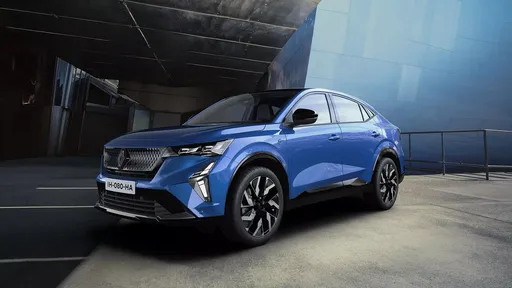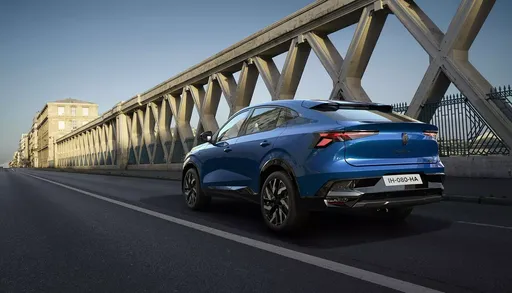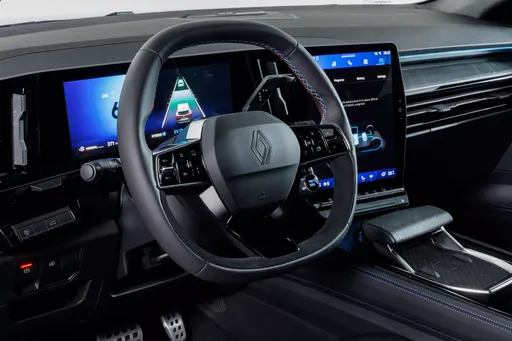Nissan Leaf VS Renault Rafale – Specs, Efficiency & Price Comparison
Which model is the better choice – the Nissan Leaf or the Renault Rafale? We compare performance (217 HP vs 300 HP), boot capacity (394 L vs 627 L), efficiency (16.70 kWh vs 0.60 L), and of course, the price (30800 £ vs 37500 £).
Find out now which car fits your needs better!
The Nissan Leaf (Hatchback) is powered by a Electric engine and comes with a Automatic transmission. In comparison, the Renault Rafale (SUV) features a Full Hybrid or Plugin Hybrid engine and a Automatic gearbox.
When it comes to boot capacity, the Nissan Leaf offers 394 L, while the Renault Rafale provides 627 L – depending on what matters most to you. If you’re looking for more power, you’ll need to decide whether the 217 HP of the Nissan Leaf or the 300 HP of the Renault Rafale suits your needs better.
There are also differences in efficiency: 16.70 kWh vs 0.60 L. In terms of price, the Nissan Leaf starts at 30800 £, while the Renault Rafale is available from 37500 £.
Compare all the key specs now and find out which model fits your lifestyle best!
Nissan Leaf
The Nissan Leaf stands out as a pioneering model in the realm of electric vehicles, known for its impressive blend of practicality and eco-friendliness. It offers a smooth and quiet driving experience, making it an ideal choice for city commuting and longer journeys alike. The interior design is both comfortable and intuitive, providing drivers with a sense of modernity and ease of use.
details @ germany.nissannews.com
@ germany.nissannews.com
 @ germany.nissannews.com
@ germany.nissannews.com
 @ germany.nissannews.com
@ germany.nissannews.com
 @ germany.nissannews.com
@ germany.nissannews.com
Renault Rafale
The Renault Rafale captivates with its sleek design and dynamic presence on the road, embodying the perfect blend of elegance and performance. Inside, the car offers a spacious and well-appointed cabin, featuring premium materials and cutting-edge technology to enhance the driving experience. Its agile handling and responsive capabilities make it a compelling choice for those seeking a refined yet thrilling ride.
details @ presse.renault.de
@ presse.renault.de
 @ presse.renault.de
@ presse.renault.de
 @ presse.renault.de
@ presse.renault.de

|

|
|
|
|
Costs and Consumption |
|
|---|---|
|
Price
30800 - 37200 £
|
Price
37500 - 49500 £
|
|
Consumption L/100km
-
|
Consumption L/100km
0.6 - 4.7 L
|
|
Consumption kWh/100km
16.7 - 17.8 kWh
|
Consumption kWh/100km
-
|
|
Electric Range
270 - 385 km
|
Electric Range
97 km
|
|
Battery Capacity
39 - 59 kWh
|
Battery Capacity
-
|
|
co2
0 g/km
|
co2
14 - 106 g/km
|
|
Fuel tank capacity
-
|
Fuel tank capacity
55 L
|
Dimensions and Body |
|
|---|---|
|
Body Type
Hatchback
|
Body Type
SUV
|
|
Seats
5
|
Seats
5
|
|
Doors
5
|
Doors
5
|
|
Curb weight
1580 - 1756 kg
|
Curb weight
1728 - 2025 kg
|
|
Trunk capacity
385 - 394 L
|
Trunk capacity
539 - 627 L
|
|
Length
4490 mm
|
Length
4710 mm
|
|
Width
1788 mm
|
Width
1886 mm
|
|
Height
1540 - 1545 mm
|
Height
1613 mm
|
|
Payload
384 - 415 kg
|
Payload
415 - 447 kg
|
Engine and Performance |
|
|---|---|
|
Engine Type
Electric
|
Engine Type
Full Hybrid, Plugin Hybrid
|
|
Transmission
Automatic
|
Transmission
Automatic
|
|
Transmission Detail
Reduction Gearbox
|
Transmission Detail
Automatic Gearbox
|
|
Drive Type
Front-Wheel Drive
|
Drive Type
Front-Wheel Drive
|
|
Power HP
150 - 217 HP
|
Power HP
200 - 300 HP
|
|
Acceleration 0-100km/h
6.9 - 7.9 s
|
Acceleration 0-100km/h
6.4 - 8.9 s
|
|
Max Speed
144 - 157 km/h
|
Max Speed
180 km/h
|
|
Torque
320 - 340 Nm
|
Torque
-
|
|
Number of Cylinders
-
|
Number of Cylinders
3
|
|
Power kW
110 - 160 kW
|
Power kW
147 - 221 kW
|
|
Engine capacity
-
|
Engine capacity
1199 cm3
|
General |
|
|---|---|
|
Model Year
2019
|
Model Year
2024
|
|
CO2 Efficiency Class
A
|
CO2 Efficiency Class
C, B
|
|
Brand
Nissan
|
Brand
Renault
|
Nissan Leaf
Introduction to the Nissan Leaf: A Pioneer in Electric Mobility
The Nissan Leaf has established itself as a trailblazer in the realm of electric vehicles (EVs) since its launch. As we delve into its present-day iterations, the Leaf continues to soar in popularity due to remarkable advancements in technology and sustainability. Let's explore what makes the Nissan Leaf a standout in today's automotive market.
Power and Performance: Under the Hood of the Nissan Leaf
The Nissan Leaf boasts a power output ranging from 150 to 217 PS, depending on the battery option chosen. The vehicle's electric motor, a product of cutting-edge engineering, offers instant torque ranging from 320 to 340 Nm, resulting in impressive acceleration capabilities. The 0 to 100 km/h dash is achieved in as little as 6.9 seconds, showcasing its prowess in electric performance.
Battery Technology: Efficient Energy Management
When discussing the Nissan Leaf, battery technology is at the forefront. The available battery capacities range from 39 to 59 kWh, supporting an electric range between 270 to 385 km. This flexibility allows drivers to choose a model that best fits their driving habits, providing peace of mind for longer journeys without frequent recharging.
Sustainability: The Environmental Edge
One of the primary attractions of the Nissan Leaf is its commitment to sustainability. As an all-electric vehicle, it produces zero CO2 emissions, placing it in the top tier of the CO2-efficiency class with an 'A' rating. This clean energy approach contributes significantly to reducing environmental impact and supports Nissan's drive towards a greener future.
Design and Comfort: Aesthetic Appeal and Practicality
The Nissan Leaf is not just about efficiency; it's also designed for comfort and utility. With its sleek hatchback body and dimensions of 4490 mm in length, 1788 mm in width, and a height of up to 1545 mm, it offers ample interior space. The boot capacity ranges from 385 to 394 litres, providing sufficient storage for everyday needs. The model accommodates five passengers comfortably, ensuring a pleasant ride for everyone.
Innovations and Safety: Advanced Features for Peace of Mind
Nissan equips the Leaf with an array of intelligent features that enhance safety and convenience. The available equipment lines, including N-CONNECTA, Tekna, e+ N-CONNECTA, and e+ Tekna, offer varying levels of technology integration. ProPILOT Assist, e-Pedal, and a comprehensive suite of driver-assistance technology are just a few examples that highlight Nissan's commitment to innovation in the EV market.
Conclusion: The Nissan Leaf Continues to Lead
With prices ranging from €35,900 to €43,400, the Nissan Leaf remains an attractive choice for those looking to embrace electric mobility. It perfectly balances performance, design, and sustainability, making it a compelling choice in the competitive EV landscape. The Nissan Leaf not only represents the future of driving but also reinforces why it continues to be a leader in the electric vehicle community.
Renault Rafale
Introducing the Renault Rafale: A Technological Marvel
Renault's 2024 Rafale is a showpiece of modern automotive engineering, residing elegantly within the SUV category. Boasting sleek designs alongside groundbreaking hybrid technology, the Renault Rafale promises not only to meet the demands of contemporary drivers but to exceed them.
Powertrain and Performance
Under the bonnet of the Renault Rafale, you’ll find a range of hybrid powertrain options, both full hybrid and plug-in hybrid configurations. These systems combine efficient combustion engines with electric motors, outputting between 200 and 300 PS (147 to 221 kW) to deliver dynamic performance with eco-friendly emissions, achieving fuel efficacies as low as 0.6 L/100 km.
The vehicle's top speed is 180 km/h, and drivers can expect rapid acceleration from 0 to 100 km/h in just 6.4 to 8.9 seconds, owing to the automatic transmission and refined front-wheel-drive mechanism.
Technical Specifications
Measuring an extensive 4710 mm in length, 1886 mm in width, and with a height of 1613 mm, the Rafale’s dimensions underscore its commanding road presence. Occupants benefit from a spacious interior, seating five comfortably, with an ample boot space ranging from 539 to 627 litres.
The vehicle's build focuses on a blend of lightweight materials and robust structural engineering, contributing to a kerb weight between 1728 and 2025 kg, and regulated CO2 outputs of 14 to 106 g/km. With its efficient hybrid motors, the car delivers on torque, although it is officially rated at 0 Nm due to the nature of electric drivetrain torque measurement.
Innovative Features and Design
The Renault Rafale’s innovation extends beyond its engine bay. It features a multi-mode automatic gearbox, enabling seamless transitions between various driving modes for optimal performance under different conditions. Available in Esprit Alpine, Techno, and Atelier Alpine trims, buyers are offered choices that refine the driving experience on every level.
The sophisticated exterior is matched by an equally advanced cockpit, integrating cutting-edge digital interfaces to enhance driver engagement and passenger comfort. From its infotainment system to advanced driver assistance features, the Rafale represents a marriage of futuristic functionality and luxury.
Environmental Efficiency and Pricing
The Rafale's eco-credentials are further evidenced by its competitive CO2 efficiency classes ranging from C to B, demonstrating Renault’s commitment to reducing environmental impact. The plug-in hybrid variant also offers an impressive electric range of up to 97 km, perfect for urban commuters looking to minimise fuel consumption.
Priced between €43,800 and €57,800, the Renault Rafale positions itself attractively within the premium hybrid SUV segment, offering both value and advanced technology for the discerning eco-conscious driver.
Conclusion
The Renault Rafale SUV embodies a leap forward in automotive design and engineering. It’s not just a vehicle; it’s a statement on efficiency, performance, and innovation, poised to capture the attention of drivers ready to embrace the future of motoring.
The prices and data displayed are estimates based on German list prices and may vary by country. This information is not legally binding.
